The Global Green Growth Institute’s thematic approach to green cities supports an integrated and cross-sectoral approach and responds to local, national, and global needs and commitments, through five priority areas:
- Mainstreaming green growth into urban planning and management;
- Resource efficient and low carbon cities;
- Solid waste management: managing waste as resource;
- Decentralized sanitation and wastewater solutions;
- Sustainable transportation and mobility: connected and healthy cities.
In Rwanda, GGGI has District Technical Assistants (DTA’s) that are embedded in the six secondary cities that provide technical support to the District office, local government and One Stop Centre. The DTA’s have numerous technical roles such as mainstreaming green growth into the district short and long term plans for example the elaboration of the District Development Strategy (DDS) and the inclusive green growth for the revision of the city masterplans; translating green growth action plans into more comprehensive on the ground activities such as the Public Bike Sharing initiative , green building campaigns, electric mobility ; and facilitate capacity development on green urbanization and green growth for district authorities and technicians such as Training of the Trainers and sector level training’s , and supporting the district with conceptualizing green growth bankable projects , to green investment and implementation.
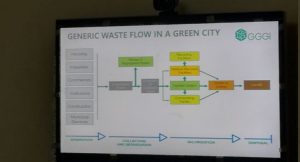
During the Urban October month the Global Green Growth Institute organized a series of activities ,events and discussions in support of the Global Theme around sustainability and green cities. The Urban October month began with World Habitat Day on 1 October and ended with World Cities Day on 31 October. The theme for World Habitat Day 2019 was “Municipal Solid Waste Management”, and for World Cities Day was “Building Sustainable and Resilient Cities”.
On the 1st of October the GGGI Rwanda Urbanisation team visited Huye District to officially hand over the Solid Waste Management assessment report to the districts officials and share findings with the districts stakeholders. Vice Mayor of Huye Mr Kamana, District technical staff , Rwanda Housing Authority officials , Land Fill Managers and One Stop Center staff were present and had an interactive session with as the GGGI Rwanda Country Representative Inhee Chung, Okechukwu Daniel Ogbonnaya Rwanda Lead Program Co-ordinator and Jean Pierre Munyeshyaka GGGI Rwanda’s Senior Associate :Green Urbanization gave the detailed presentation and analysis of the key findings and recommendations of the report. After the presentation districts officials, students and representatives from University of Rwanda joined the Huye Urban Walk to learn more about icon historical buildings and architecture in Huye that was organized by the Global Green Growth Institute.
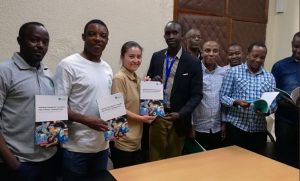
District Officials and key stakeholders in Huye Secondary City
On 29th October Green Drinks Kigali in collaboration with GGGI Rwanda hosted the monthly public open dialogue with the topic on “Solving Rwanda’s Solid Waste Challenge”. The discussion was moderated by GGGI Rwanda Country Representative Inhee Chung, and had four panel speakers namely: John Mugabo Solid Waste & Liquid Management Officer at City of Kigali ; Joseph Jeff Murenzi , Director of Water Supply & Sanitation Development at WASAC and Patrick Irankunda MD of Jap Group Ltd. Green Drinks Kigali is held every month at the Impact Hub in Kiyovu, Kigali as an open free dialogue with 8 volunteer committee members from different organisations that organize the monthly discussion with topics ranging from “environmental science to sustainable development”.
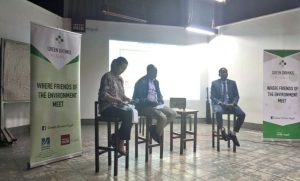
Panelists at the Green Drinks Discussion
On 30th October the GGGI Urbanisation team visited Muhanga District to officially hand over the Solid Waste Assessment Report to the District of Muhanga Senior Management Officials, technical staff and One Stop Center representatives. Followed by the Urban Cinema hosted by the Muhanga district and organized by GGGI with MININFRA and the University of Rwanda.
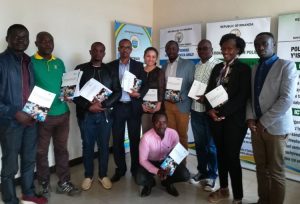
District Officials and key stakeholders receive the Solid Waste Management Assessment Report in Muhanga District
The Solid Waste assessment report was produced using descriptive analytics based on field observations, desk study, informant interviews, and surveys. The field mission was conducted from September 12 to 20 in 2018 by a group of thematic experts including Ms. Shomi Kim (Green Cities Analyst), Mr. Jean Pierre Munyeshyaka (Senior Associate, Rwanda), and Mr. Pius Nishimwe (Solid Waste Management Consultant). The field missions included meetings and discussions with different stakeholders involved in the solid waste sector such as district governments, waste collection companies, recycling companies, junk shop owners, and waste pickers at the district levels in Huye and Muhanga. Stakeholder meetings at the central level, such as with Rwanda Utilities Regulatory Authorities (RURA), financial institutions and development partners, were also held to assess the regulatory framework and financial mechanisms to promote micro-enterprises in waste services provision.
The objectives of the assessment report was to conduct a deep assessment of solid waste management value chain ; to propose impactful intervention areas and achieve sustainable municipal solid waste management. The methodology used was a desk review and stakeholder consultations (District officials, village leaders, service providers, fields visits to junk shops and dumpsite, House hold surveys selected randomly)
Some Key findings in Muhanga:
- there is no sanitary landfill
- Waste is disposed at an uncontrolled dumpsite located at in Kanyinya sector, which is 12km from the city center. It is not fenced nor easily accessible
- A private company managing this site hired informal waste pickers who mainly separate organic waste. This organic waste is not recovered into resources
The intervention areas for Muhanaga are:
i). Developing transit sites with decentralized waste composting and other recycling facilities
ii). Developing a regulatory framework for waste collection services and pricing
Key findings in Huye:
- Existing sanitary landfill is accessible with basic infrastructure and managed by a private company
- Organic waste segment is processed into organic compost.
- No tipping fees paid by collection companies
- Disconnect in supply chain: Local plastic recycling company operating in Huye. Company recycles two types of plastics – low-density plastic (LDP) and high-density plastic (HDP) with sourcing from Kigali (not existing landfill). Plastic waste from landfill being supplied to Uganda.
The recommendations for Huye district were that Huye district government should focus on two areas
- i) promotion of municipal waste collection services and waste-to resource initiatives, and
- ii) increasing municipal own-source revenue generation in the waste sector
GGGI recommends that improved waste-to-resource initiatives are implemented in conjunction to increasing waste collection coverage in order to ensure a sustainable system overall and consideration be given to cross-sector opportunities, such as integrated solutions for solid waste and fecal sludge management through co-composting facilities.
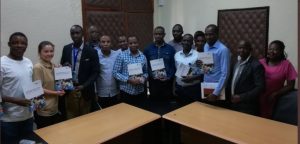
To read more about GGGI Projects in Waste Management across the globe visit their country programmes news updates and technical reports in Rwanda ; Uganda ; Senegal ; Lao PDR ; Myanmar ; India ; Cambodia ; Thailand ; Colombia ; Vietnam